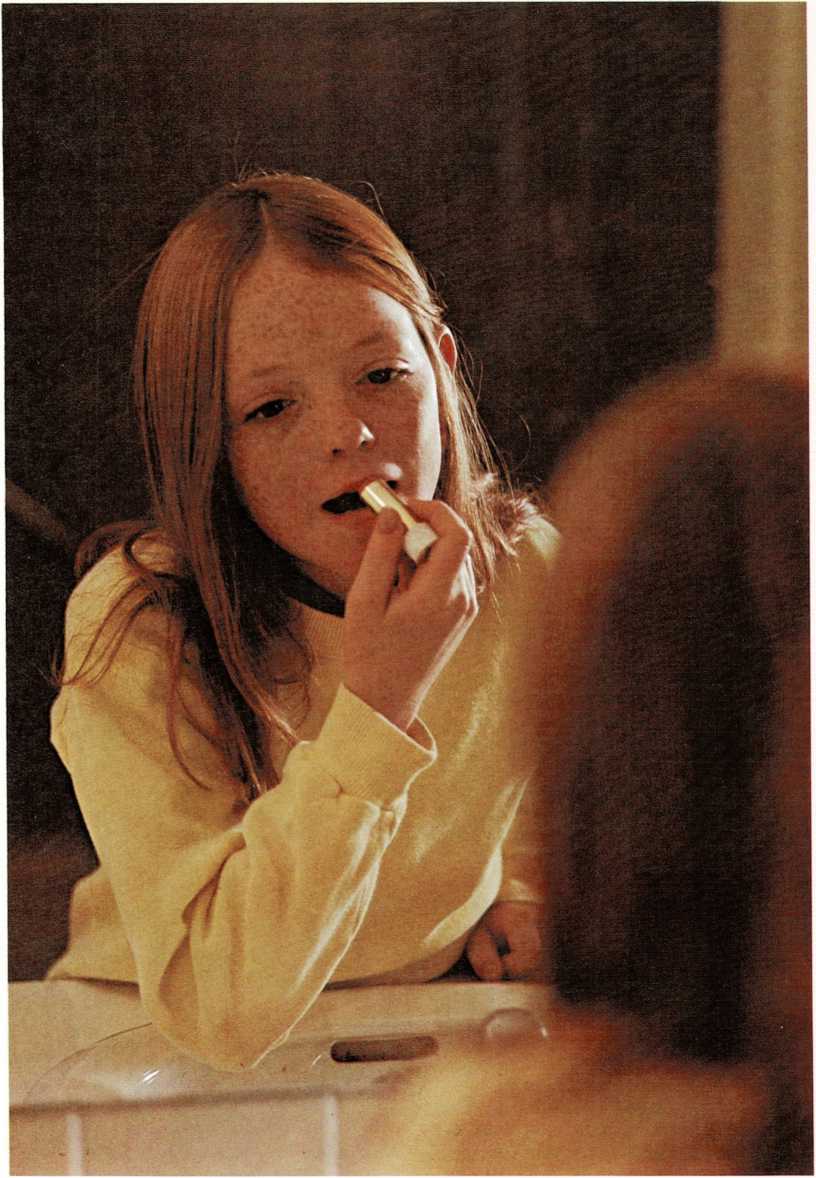The preteen and “the gang”

Ever since children entered school, they have been learning that the
group is something to be reckoned with. Always, part of their concern
was to be accepted according to the group standards set by the
neighborhood play group or their schoolmates. In the pre teen period,
however, what was perhaps a marginal problem suddenly becomes an
essential adjustment.
The most important part of the world used to be the family. Suddenly,
the “kid

During the preteen period, the gang may become more important than
the family.
culture” of the neighborhood takes over. Now the important thing in the
children’s lives is to be in line with the code of their peers, even at
the cost of considerable open conflict with their families.
Characteristics of group leaders take on extra significance in the lives
of preteens.
Parents become “The Adults”
Many parents report that what hurts most during the preteen period is
the peculiar way in which preteens cut off whatever relationships have
existed between them and their parents by suddenly making their parents
“The Adults.” You know that they know better, that they love you,
but—especially in public—they treat even your fair demands as angry
insults from an enemy. In fact, once your child has shifted you from the
role of parent to the role of “The Adult,” nothing personal may remain.
You may become two power agents in battle.
You may happily suggest to your daughter that she have some of her
friends over for a party. Her comment: “Where will you be?” You stammer
something about being somewhere in the house and assure your offspring
that you will not intrude on her fun. You get the rejoinder,”But we
don’t want any Adults around.” It is hard to accept the fact that to
your own child you are suddenly an archenemy. Of course, you should take
consolation in the fact that not all preteens react so dramatically.
Your child’s attitude is normal. In fact, the more youngsters are
“attached” to a

Experimenting with lipstick is normal for a preteen girl but may
cause conflict with parents.
parent, the heavier is their need to defend against the parent—or the
attachment to the parent. It is often the very loving and beloved
parent, the very cordial teacher, who bears the brunt of this puzzling
behavior. And although it is easier to understand than to bear, it
should not be taken personally. The battle stance between the preteens
and parents or teachers as “the authorities to be challenged” does not
mean that the relationships deteriorate permanently. It only means that,
in certain moments of their lives, children perceive themselves as
members of the preteens. And that leaves parents and teachers in the
role of “The Adults.”
Most preteens experience such moments frequently. There is no reason for
concern unless the experiences become so all-inclusive that no personal
relationship remains between parent and child.
Secrecy
Another way the preteen may try to cut you out of things is to have
secrets. Girls, especially, may tease you by mentioning something
somebody said or did, and then clam up if you want details. The
youngster who previously ran to you with every little concern now cuts
you off. Inquiries about what happened at school are met with a curt
“Nothing.”
This secrecy has reasons, though, and is part of the normal preteen
trend. Partly, it is the preteen’s need to have a domain safe from adult
invasion. The content of a secret may be irrelevant. It is the fact of
having one that counts.
Even some of the preteens’ need to collect things and keep the things in
their pockets or dresser drawers is part of that need to have their own
domain. For example, if parents try to get the preteen’s stamp or coin
collection transformed into a well-organized enterprise, parents may
find that the child loses interest in the hobby. The hobby has become
family domain instead of something for the child alone to deal with.
Related to the need for secrets is the fact that at this age
communication often comes easier with other adults than with parents.
This does not mean that your child has lost confidence in you. It is
simply typical.
Picking up the dare
During the preteens and teens, even the most wonderful youngster may
become extremely vulnerable to the compelling illogic of a dare. Under
certain conditions a pre- teen must pick up a dare, no matter how silly,
dangerous, disgusting, or obnoxious it is. A child who does not pick up
a dare loses honor in the eyes of the group.
Picking up the dare is seen most clearly in the older teen-ager. In the
preteen years, the kind of dare children are exposed to is not so easy
to recognize, but plays as heavy a role. A preteen may, for example,
accept a dare to put thumbtacks on the teacher’s chair, talk dirty in
public, thumb the nose at an adult, or talk back to an adult.
Dare situations may develop even when the gang is not around.
Psychologically, preteens may feel that the gang is looking over their
shoulders. If the way parents scold preteens or demand compliance seems
to constitute an unwritten dare, the youngster may suddenly become
silly, stubborn, fresh, or defiant. They then become actors in a show
put on for the benefit of the absent group. They have to accept the dare
or

Preteens must pick up a dare. If they do not, they lose honor in the
eyes of the gang.
they will violate the code that governs their actions.
In dealing with a dare, avoid “extraneous reasoning.” Do not resort to,
“Your cousin Janice doesn’t wear lipstick,” or “When I was your age, I
never would have done that.”
Fortunately, only a few situations at a time become loaded with this
dare-vulnerability. In all other areas the child remains as reasonable,
or at least as easy to influence, as before. For one youngster, being
asked to wear warm underwear or put on boots and mittens may be an
unbearable demand; for another, an anxious admonition not to climb a
tree or talk back to a teacher is an unbearable challenge. For another,
a parent’s concern about lipstick, table manners, or language may be it.
And what is “it” changes from time to time.
These dares, although changeable, are fairly easy to identify. A more
important concern, and one that is not easy to satisfy, is just what
constitutes a dare when your preteen is alone with the gang. If the
child shows signs of disturbing behavior, or is having unusual trouble
at school, you will want to know if it is in response to a dare or if a
basic problem is involved. Your child’s teacher or school counselor may
help you answer this difficult question.
If your youngster is heavily dependent on what you consider the bad
standards of the group, the worst thing you can do is preach against
them. This is considered an additional dare for the child to show
loyalty to those friends, in spite of knowing better and being sure that
you are right. Strengthening your child’s own judgment and awareness is
the only safe way to help, but this is a longtime job. Remember that
success is not achieved overnight.
Face-saving
Many minor issues of daily life, such as schedules or parents’
suggestions about what clothing to wear, may put children into a
situation in which they are afraid of surrendering too openly to adult
demands. Immediate and easy acceptance of adult orders somehow reminds
preteens too much of early childhood years. Even though they
realize that their parents’ demands are perfectly reasonable, they still
have to fight before surrendering. It is honorable to surrender after
battle, but simply giving in is cowardly and childish. This has nothing
to do with the question of children’s love for their parents and their
respect for parents’ values. They need to maintain pride in their own
decision-making powers.
In fact, just to have the proud feeling of doing the right thing,
children may do what parents suggested “on their own.” They can only
achieve this feat if they first refuse to do something, and then do what
their parents want because they themselves “decided” to do it.
Any mother who has ever sponsored a Cub Scout meeting may remember that
her own child behaved the most poorly. The reason for the bad behavior
was simply that obeying mother in public can be construed by others in
the gang as childish. The only way to show that the child is no longer
hanging onto mother’s apron strings is to defy her openly. Stop your
child’s behavior or tolerate it—but do not discuss it in front of
other children.
The need to show up well in the group does not end with the preteen
period. The preteens have only begun practicing it. In many cases it
will be with them, and you, all through the teen-age years. And, sorry
to say, it is likely to get worse.
Toughness
Young children, when having problems, seek refuge in a friendly adult
apron. If serious problems hit teen-agers, they long for the friendly
shoulder of an understanding adult. Most preteens want neither—or if
they do, they would rather be “caught dead” than admit it.
The informal preteen group code views any friendly talk with an adult as
childish, sissyish, and cowardly. Also, according to preteen philosophy,
trouble is a source of pride, not shame. You do not have problems as a
preteen. You cause problems for others. Then they cause problems for
you, so you fight back or take it. It may be hard to handle, but it is
better to go under in glory than to ask for help or advice.

When preteens gather, they may not want “The Adults” intruding at
their parties.
Preteen love
Love in the preteen years is like a game. And it is a game that almost
every preteen in the group plays. Preteen girls spend much time trying
to get a “boyfriend,” and many preteen boys are busy trying to find a
“girlfriend.” But these friendships seldom blossom into love.
Most preteen boys and girls do not see the person of the other sex as a
love object in the way that will become apparent in adolescence. There
are, however, many exceptions to this, and a semblance of being in love
may become apparent from time to time. But preteen boys generally
consider girls merely as members of the other sex. Girls are acceptable,
or not, primarily on the basis
of the same criteria by which anybody else is acceptable to the group.
Girls operate in the same way, but they quickly tire of boys their own
age and develop “crushes” on older boys in higher grades.
During these years, boys and girls still consider each other “closed
groups.” The importance of getting a girlfriend or a boyfriend is in
winning the game. Then a girl can tell her less fortunate girlfriends
that she has a steady, that she is in love. And the boy can go bragging
to his buddies. Probably all they do is walk home from school, go to the
library, or go skating— accompanied by the group. Left alone they
might well have a hard time carrying on a five-minute conversation.

